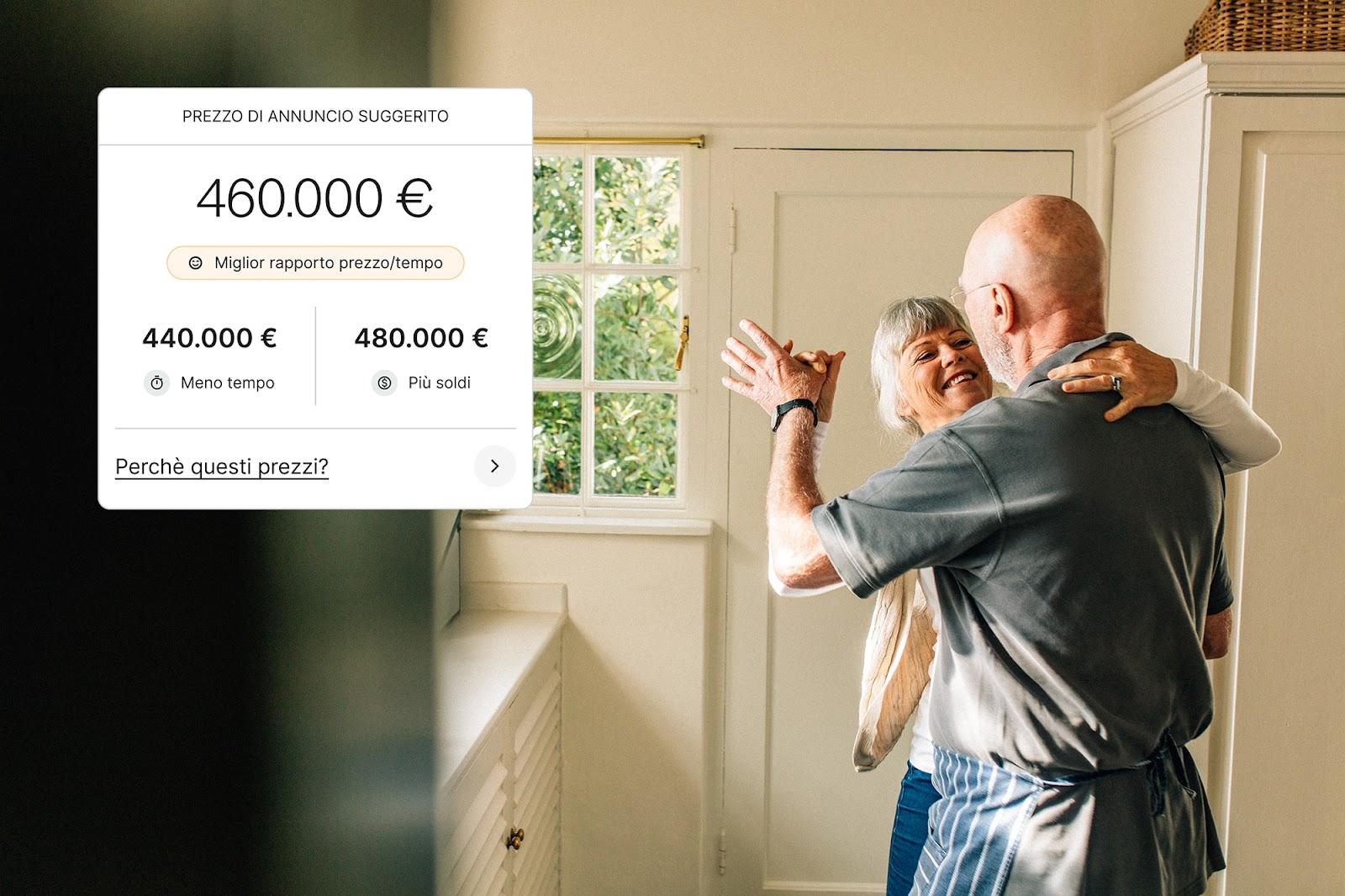Index
Evaluating a home is a fundamental step both for those who want to sell their property and for those who intend to buy it. Knowing the real value of a property can avoid unpleasant surprises and ensure a fair transaction for both parties involved. But how much does it really cost to have a home appraised? In this comprehensive guide, we will analyze the various factors that influence the cost of real estate valuation, offering practical advice and useful information to guide you through this process. We will discover together the different options available and how to choose the one that best suits your needs.
Casavo revolutionizes the real estate market with its innovative model, making the sale of a property transparent, easy and fast. By offering an instant valuation of their property based on databases such as the Real Estate Market Observatory (OMI), sellers can manage the entire sales process remotely, using apps, email or by contacting Casavo real estate consultants directly.

[cta-casavo title="Sell your home with Casavo" text=" ✅ 1% fixed commission ✅ an expert always at your side ✅ document certification"]
Introduction to real estate valuation
Importance of assessment
The valuation of a property is crucial for several reasons. First, it provides an accurate estimate of the property's market value, allowing sellers to set a realistic and competitive price. Likewise, buyers can avoid overpaying for a home. In addition, a precise assessment is essential to obtain bank financing; banks, in fact, require expertise to grant mortgage loans. Finally, the valuation is also useful for tax and legal purposes, such as in the case of inheritances or asset divisions. In summary, knowing the value of a home guarantees transparency and security in all real estate transactions.

When is it necessary
Real estate valuation is necessary in different situations. First of all, when you decide to sell your home, an accurate valuation helps determine a fair and attractive sale price. Buyers also benefit from the valuation, as they can ensure that they are not paying more than market value. In addition to buying and selling, valuation is essential to obtain a mortgage loan: banks require an expert opinion to establish the amount that can be financed. Additional situations include inheritance divisions, where it is essential to know the exact value of assets for proper distribution, and lawsuits involving real estate. Finally, an assessment is also useful for insurance purposes, to determine the right premium to pay. In all these circumstances, an accurate assessment guarantees transparency and security.
Factors that influence
Several factors influence a home's valuation. First, the geographical position is decisive: a property located in a central or well-served area will have a higher value than one in the suburbs. The size and layout of interior spaces are other key elements; larger, well-distributed homes tend to have higher ratings. The state of preservation of the property also plays an important role: a well-maintained or recently renovated home will have a greater value. The presence of additional services, such as garages, gardens or terraces, can significantly increase the rating. Finally, the local real estate market and general economic trends can influence the value of the property. In summary, a combination of these factors determines the final value of a home, making each valuation unique.

Costs of assessment
Professional rates
The rates for evaluating a home can vary greatly depending on the professional in charge. Generally, real estate appraisers and real estate agents are the main experts to turn to. Appraiser fees can range from 200 to 500 euros, depending on the complexity and size of the property. Real estate agents, on the other hand, may offer free valuations if they plan to manage the sale of the property. In the case ofCasavo, the valuation and the sales strategy of the property is free, but if a seller wishes to proceed with the transactional process, the cost is a fixed 1% of commissions for a complete service: from the valuation to the signing of the draft. Engineers and architects, although less common for this activity, may be called into question for more technical and specific evaluations, with rates ranging from 300 to 600 euros. It is always advisable to ask for detailed quotes and compare different options before choosing the professional that best suits your needs. In this way, an accurate assessment can be obtained without incurring excessive expenses.
Additional costs
In addition to professional fees, there are other additional costs that could affect the total property valuation. For example, if the appraiser must travel to reach the property, he may charge travel expenses. In addition, in some cases, it may be necessary to obtain additional documents, such as cadastral surveys or energy certificates, which entail additional costs. If the property has structural peculiarities or complexities, such as the presence of historical elements or architectural constraints, the cost of the valuation may increase to cover more in-depth analyses. Finally, if the customer requests a sworn report, or a legally recognized official document, the cost will be higher than a simple descriptive assessment. It is therefore important to consider these possible extras when planning a property valuation, to avoid surprises and unexpected budgets.
Regional differences
The costs of real estate valuation can vary considerably from one region to another in Italy. In large cities such as Rome, Milan and Florence, where the real estate market is more dynamic and competitive, professional rates tend to be higher. Conversely, in rural or less densely populated areas, the costs for an assessment may be significantly lower. Local demand will also affect rates: in regions with a high number of real estate transactions, appraisers may charge more for their services. In addition, some regions may have specific regulations that require additional documents or special assessment procedures, further affecting costs. It is therefore advisable to find out about the average rates in your area and consider regional peculiarities when planning a property valuation. This approach will help to obtain an accurate estimate and to optimize expenses.
Assessment methods
Comparative evaluation
Comparative valuation is one of the most used methods for estimating the value of a property. This approach is based on comparing with similar properties that were recently sold in the same area. The process begins with collecting data on recent sales, including details such as square footage, number of rooms, state of preservation, and additional features. Once this information has been collected, a comparative analysis is carried out to identify the similarities and differences between the property in question and the comparable ones. The final value is then adjusted based on these differences, providing an accurate and realistic estimate. Comparative valuation is especially useful in active real estate markets, where there are many recent transactions to analyze. However, it may be less effective in areas with few recent sales, making it necessary to integrate with other valuation methods.

Income method
The income method is a real estate valuation approach that is particularly used for income properties, such as commercial real estate or rental apartments. This method is based on the property's ability to generate an income stream over time. The first step is to calculate the annual net income of the property, subtracting operating expenses from rental revenues. Subsequently, net income is capitalized using an appropriate capitalization rate, which reflects the expected risk and return from the investment. The result is an estimate of the market value based on the profitability of the property. This method is particularly useful for investors, as it offers a clear view of the potential economic return. However, it requires careful analysis of financial data and good knowledge of the market to determine an accurate and realistic capitalization rate.
Cost method
The cost method is another approach used in real estate valuation, particularly suitable for new or unique buildings. This method is based on the calculation of the cost necessary to rebuild the building, considering the price of materials, labor and other costs associated with the construction. It starts with an estimate of the cost of replacing or reproducing the new building. This amount is subtracted from accumulated depreciation, due to physical wear and tear, functional obsolescence and any other factors that may reduce the value of the property. The resulting value represents an estimate of the property's market value. The cost method is particularly useful for evaluating properties for which there are no recent comparables, such as historic buildings or special structures. However, it may be less accurate in very dynamic real estate markets, where construction costs don't necessarily reflect current market values.
How to choose an evaluator
Qualifications and certifications
When choosing a real estate appraiser, it's crucial to consider their qualifications and certifications. A good starting point is to check if the professional is enrolled in a register or a trade association, such as the Order of Engineers or the Order of Architects. These bodies regulate the profession and ensure that members meet high standards of competence and deontology. In addition, there are specific certifications in the field of real estate valuations, such as those issued by RICS (Royal Institution of Chartered Surveyors) or by REV (Recognised European Valuer). These certifications attest that the evaluator has passed rigorous exams and continues to take professional refresher courses. Finally, it is useful to verify the evaluator's practical experience in the local market, since a thorough knowledge of the area can make a difference in the accuracy of the valuation. Choosing a qualified, certified evaluator is essential to obtaining an accurate and reliable estimate.
Experience and reputation
The real estate appraiser's experience and reputation are crucial aspects to consider when choosing. A professional with many years of experience will have dealt with a wide range of situations and will be able to provide more accurate and detailed assessments. It is useful to ask for references or read reviews online to get an idea of the quality of the service offered. A good reputation in the industry is often an indicator of reliability and expertise. In addition, evaluators with solid experience in the local market will have a deeper knowledge of regional dynamics, market trends and the peculiarities of the different areas. This can make a big difference in the accuracy of the assessment. Don't hesitate to ask the evaluator to share examples of previous evaluations or case studies similar to your situation. That way, you'll be more confident that you're choosing a capable and respected professional.

Questions to ask
When choosing a real estate appraiser, it's important to ask a few key questions to ensure you're making the right choice. First, ask about their qualifications and certifications to verify their professional competence. Another useful question concerns specific experience in the type of property you are evaluating; an appraiser experienced in residential real estate may not be the best choice for a commercial property. Also ask to see examples of previous evaluations or references from satisfied customers. It is important to understand the evaluation method they intend to use and whether they can clearly explain the process. Finally, discuss the fees and possible additional costs, to avoid surprises at the end of the work. By asking these questions, you will have a clearer view of the evaluator's skills and reliability, ensuring an informed and safe choice.
Helpful Tips
Prepare the house
Preparing the home for an assessment can positively affect the final result. First, make sure the property is clean and tidy; a well-kept environment can make a better impression on the evaluator. Small maintenance tasks, such as fixing leaking faucets or fixing creaky doors, can make a difference. It's also helpful to declutter spaces, removing personal items and bulky furniture to make rooms appear more spacious and bright. If possible, make small cosmetic improvements such as a new coat of paint or the replacement of old lamps. Finally, prepare all the necessary documentation, such as floor plans, energy certificates and cadastral surveys, to facilitate the work of the evaluator. A well-presented home not only makes the valuation process smoother, but it can also help to obtain a higher and more accurate estimate.
Necessary documents
To facilitate the evaluation process and ensure an accurate outcome, it is essential to prepare and submit a series of documents to the evaluator. Among the most important documents we find the cadastral plan, which provides a detailed representation of the interior spaces of the building. The certificate of destination Urban planning is another crucial document, as it certifies the property's compliance with local building regulations. It is also useful to have the energy certificate handy, which indicates the energy class of the house and can influence the market value. Cadastral surveys provide information on the property and on any existing constraints or mortgages. Finally, any documents attesting to renovations or improvements carried out may be useful to demonstrate the added value of the property. Preparing these documents in advance will make the assessment process smoother and more accurate. If you decide to sell with Casavo, we take care of the bureaucratic part.

What to do after the assessment
After receiving the valuation of your property, it is important to carefully analyze the report provided by the appraiser. Verify that all information is accurate and that the methods used have been correctly applied. If you have any doubts or questions, do not hesitate to ask the professional for clarification. Once you understand the details of the assessment, you can make more informed decisions. If you're selling, use the estimated value to establish a competitive selling price. If, on the other hand, you are about to buy, compare the valuation with the asking price to negotiate any reductions. In addition, if you obtained the assessment for financial reasons, such as access to a mortgage, use the document to facilitate negotiations with the bank. Casavo also offers financial services, Casavo Mortgages is a credit broker that takes care of interfacing with banks and finding the best offer for you. Finally, keep the assessment in a safe place, as it may be useful for future transactions or insurance purposes.

[cta-casavo title="Not sure where to start?" text="Yes, request a free consultation. "]
